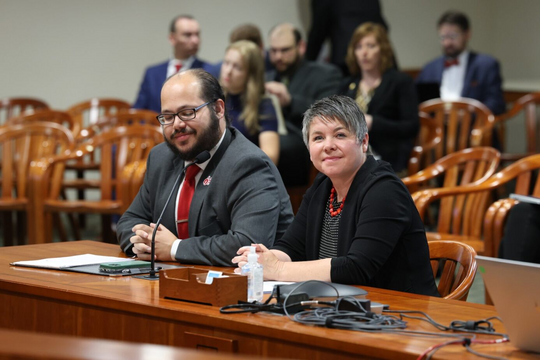LANSING, Mich., October 19, 2023 — State Rep. Betsy Coffia (D-Traverse City) celebrated the unanimous passage of her bill, House Bill 4516, by the Michigan Senate. HB 4516, once enacted, will formally expand state domestic violence resources to Tribal service providers.

State Rep. Betsy Coffia (D-Traverse City), right, testifies in the House Criminal Justice Committee alongside Heath Lowry of the Michigan Coalition to End Domestic and Sexual Violence.
“Tribal shelters and service providers should have every opportunity to secure the resources they need to support survivors of domestic and sexual violence as non-tribal shelters and service providers,” Coffia said. “This bill recognizes the importance of amending our laws to respect the partnership that Michigan has with our federally-recognized Tribal nations while uplifting survivors of domestic and sexual violence and their service providers.”
HB 4516 previously passed the House Criminal Justice Committee unanimously and received strong bipartisan support when it passed the full House, 103-3. The bill also passed the Senate Civil Rights, Judiciary, and Public Safety Committee unanimously. The bill now heads to the governor’s desk for her signature.
This bill would provide clarity in state law and explicitly allow the Michigan Domestic and Sexual Violence Prevention and Treatment Board, located within the Michigan Department of Health and Human Services (MDHHS), to provide certain funding to Tribal domestic and sexual violence shelters and service providers. These funds can currently be allocated to local governments, nonprofit associations, and private organizations, but currently there is legal ambiguity as to whether Tribal providers are eligible recipients. These Tribal programs not only provide life-saving services to all survivors, but also provide unique, culturally specific services that Native survivors cannot find elsewhere.

State Rep. Betsy Coffia (D-Traverse City), left, testifies in the Senate Civil Rights, Judiciary, and Public Safety Committee alongside Heath Lowry of the Michigan Coalition to End Domestic and Sexual Violence.
“Equitable access to funding for tribally operated domestic and sexual violence service providers is imperative to maintaining lifesaving services for all Michiganders,” said Sarah Prout Rennie, executive director of the Michigan Coalition to End Domestic and Sexual Violence. “Tribal domestic and sexual violence service providers supply vital support to survivors in their local communities. They don’t turn their back on any Michigander, so Michigan shouldn’t leave them out.”
“We’re absolutely supportive of this legislation as it provides more opportunity for equitable access to funds for tribes to provide services to their citizens, as American Indian/Alaskan Natives experience the highest rates of violence and often have unique considerations related to victimization that are best responded to by Tribal service providers,” said Rachel Carr-Shunk, executive director of Uniting Three Fires Against Violence.
“The amendments created by this bill will positively impact our rural community, allowing us to ensure our continued support with counseling, shelters and service providers in a meaningful response to violence which disproportionately impacts Native American and Alaskan families,” said David M. Arroyo, chairman of the Grand Traverse Band of Ottawa and Chippewa Indians’ Tribal Council.

